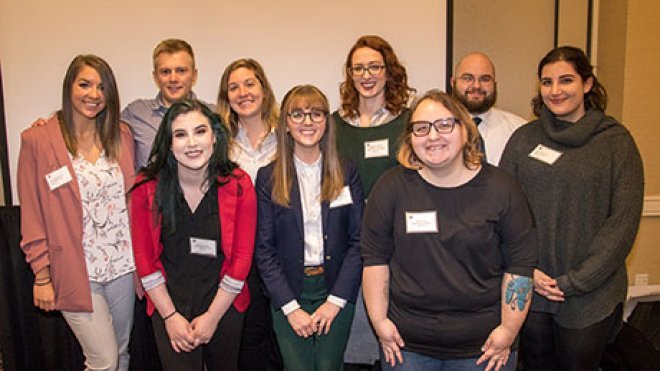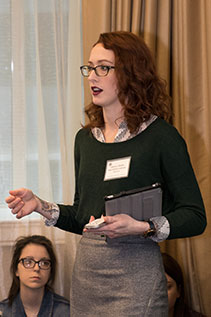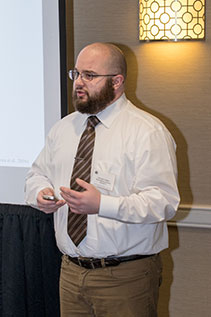Graduate Students and Faculty Share Research on Jurors' View of Death Penalty at Eastern Psychological Association Annual Meeting
Faculty-student research team delivered their own session to standing-room audience

PHILADELPHIA – Presenting a paper at an academic conference is a great achievement for any college student, but five graduate students and a faculty member from the M.A. Forensic Psychology program earned the distinction of being invited to deliver their own session on their research as part of the Annual Meeting of the Eastern Psychological Association (EPA) March 2.
Another two graduate students and two undergraduate students from Roger Williams University also presented papers at the conference.
Speaking to a standing-room-only crowd as part of an Invited symposium, Psychology Professor Judith Platania and her team of first-year graduate students presented their research titled, “How Jurors Think About the Death Penalty: A Cognitive and Affective Paradigm.”
“The central premise of this research project was to highlight the importance of applying theoretical models in understanding juror attitudes, beliefs and behaviors,” Platania said. “Our idea was to utilize positioning theory, the affect infusion model, and epistemological knowing, in expanding our notion of how jurors think about the death penalty.”
The symposium featured work by forensic psychology graduate students Cassandra Beinemann, Cassie Flick, Danielle Rieger, Rachel Serafinski, and Nicholas Zike. Each presented a segment of the research that complemented strengths they brought to the program.

“We collaborated to ensure everyone had their own portion of the research project to own and contribute to the overall presentation,” Rieger said. “This was a great opportunity to design a research project in a way that would incorporate multiple manipulations and design techniques into one study, while maintaining power and control.”
Professor Platania is a recognized expert in legal psychology, contributing significant research on jury decision-making and prosecutorial misconduct to the field of psychology and law. She has collaborated on her work with many graduate students interested in legal psychology research over the 10-year history of the M.A. Forensic Psychology program at RWU.
For this research, graduate students developed the experimental materials used for the study and helped formulate research questions. Students then focused their individual research on various aspects of the sentencing phases of a trial, such as jury selection, expert testimony, and judge’s instructions, which served as the basis for their presentation at EPA.
According to Platania, this particular study was unique because it focused specifically on neuroimaging and its relationship with psychology and the law.
“We wanted to investigate whether and to what extent jurors use neuroimaging as a mitigating factor when deciding verdict in a capital trial,” she said.
In addition to the graduate students invited to discuss their research at the symposium, other graduate students had the opportunity to showcase their research at the Annual Meeting. First-year clinical psychology student Matthew Conrad and forensic psychology students Sarah Burnham and Nicholas Zike presented their research titled, “Ethnic Differences in Psychological Well-Being.” Their research was conducted in collaboration with RWU psychology faculty members Alejandro Leguizamo and Erin Tooley.
“Our research focused on trying to understand what contributes to psychological well-being for different racial and ethnic groups,” Conrad said. “We're hoping to inform clinical treatment by providing counselors and practitioners a better idea of what helps different populations of patients.”

Students in the 45-credit M.A. in Clinical Psychology and M.A. in Forensic Psychology programs come to RWU to build a strong research foundation for future Ph.D. study. Graduates have gone on to pursue doctoral study at prestigious institutions throughout the U.S. and abroad. Professor Platania emphasized that the opportunity to present and to publish research for graduate students is critical to their future success.
“It prepares them for professional interactions with colleagues and can also be an opportunity for students to network with individuals in other programs,” she said.
Zike, who relocated from Oregon to pursue the program and presented as part of both graduate presentations at EPA, agrees.
“I chose to come to RWU because I was convinced that the professors were committed to my education and experience,” he said. “I had been accepted to eight schools, but I was convinced that RWU would provide me with plenty of resources and the freedom to pursue a variety of interests.”
Two RWU undergraduate psychology students, Emily Alton and Janine Petracca, also presented research at the Annual Meeting.